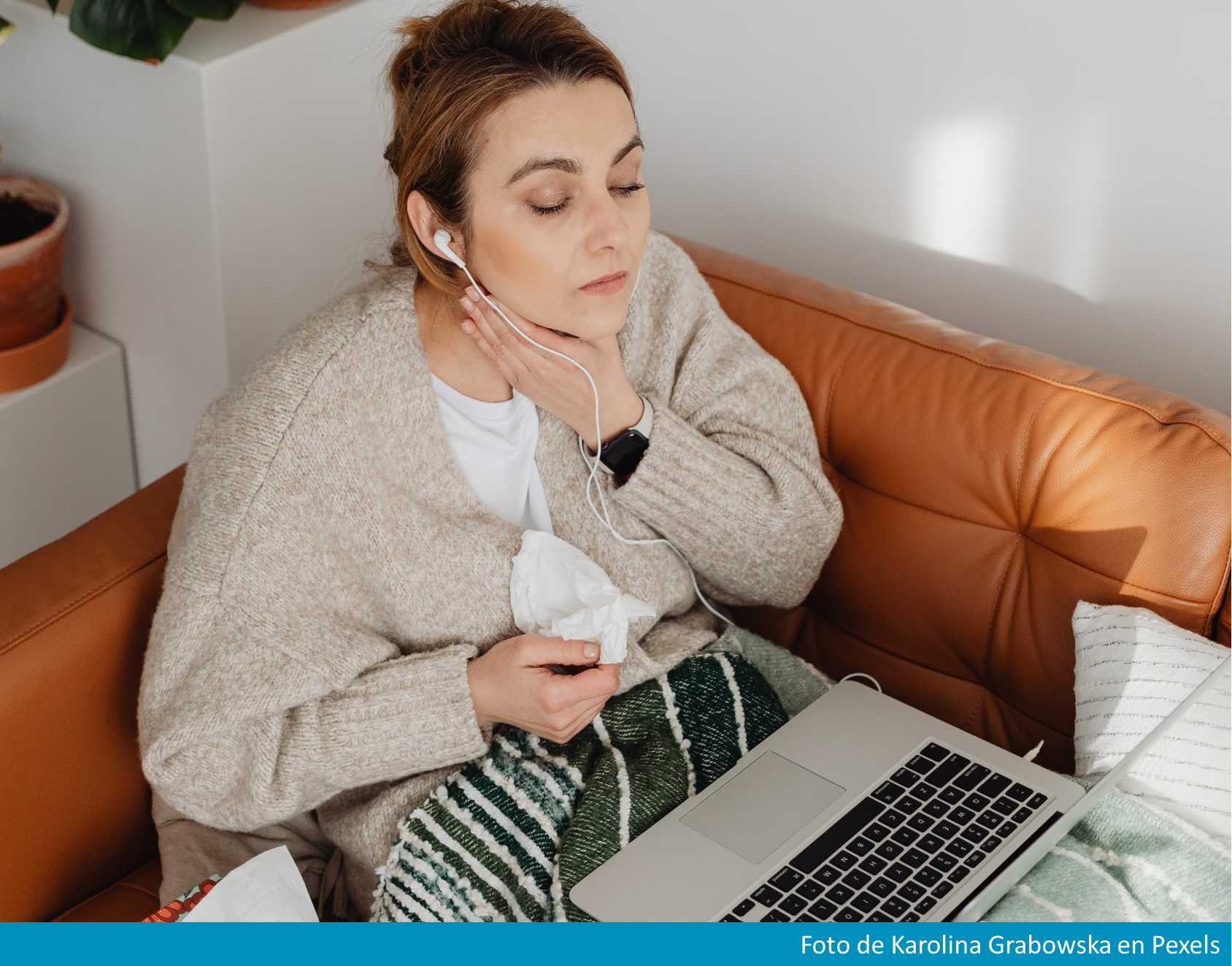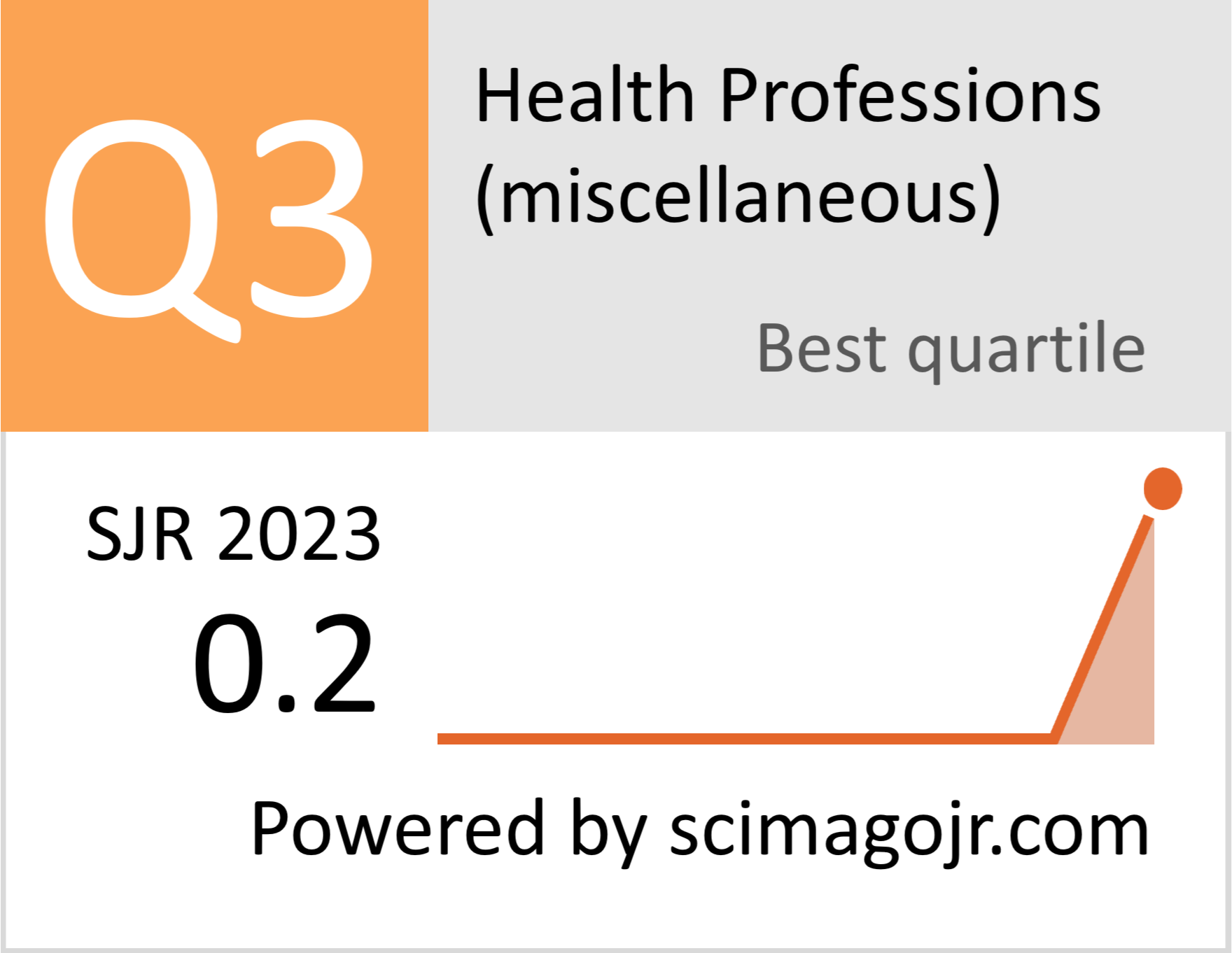Voice Disorder, Job Stress, and COVID-19 in Teachers: Impacts in Times of Pandemic
Trastorno de la voz, estrés laboral y COVID-19 en profesores: repercusiones en tiempos de pandemia

This work is licensed under a Creative Commons Attribution-NonCommercial-NoDerivatives 4.0 International License.
Show authors biography
Introduction. The conditions of teachers' work during the COVID-19 pandemic affected teachers' lives regarding voice disorder and stress, even in emergency remote classroom situation.
Objective. To analyze the relationship between the presence of voice disorder, job stress, and COVID-19 in teachers when in emergency remote classroom teaching situation at the time of the pandemic.
Method. This is a primary, exploratory, observational cross-sectional study with the use of survey forwarded online during the period of emergency classes after the arrival of COVID-19 pandemic in Brazil. The teachers answered the sociodemographic questions about the presence of COVID-19 and the following instruments: Condition of Vocal Production-Teacher [Condição de Produção Vocal - Professor (CPV-P)], Screening Index for Voice Disorder (SIVD), and Job Stress Scale (JSS).
Results. Of the 118 teachers analyzed, 94.1% were female; the average age was 44 years. The SIVD recorded the presence of voice disorder in 66.9% of the participants. Regarding the JSS, which are the findings related to stress at work in the demand domain, the teachers showed high levels, a fact which presupposes the existence of pressure of psychological nature to perform their work.
Conclusion. The teachers self-reported the presence of voice disorder even in remote class situation, on the occasion of COVID-19, which were more common in older teachers. When comparing the presence of voice disorders, coronavirus symptoms, and stress domains in relation to demand, control, and social support, there was no significance. It is hoped that this study will help to reflect on the need to improve teachers' working conditions, strengthening work-related voice disorder actions and guiding actions for vocal care and well-being.
Article visits 455 | PDF visits 269
- World Health Organization. WHO Director-General's opening remarks at the media briefing on COVID-19 - 11 March 2020. World Health Organization [Internet]. 2020 Mar 11. Available from: https://www.who.int/director-general/speeches/detail/who-director-general-s-opening-remarks-at-the-media-briefing-on-covid-19---11-march-2020
- Organização Pan-americana da saúde. Folha informativa COVID-19 - Escritório da OPAS e da OMS no Brasil. Organização Pan-americana da saúde [Internet]. 2021 [cited 2021 June]. Available from https://www.paho.org/pt/covid19
- Wu Z, Mc Googan JM. Characteristics of and Important Lessons from the Coronavirus Disease 2019 (COVID-19) outbreak in China. JAMA [Internet]. 2020 Feb 24;323(13):1239-42. doi: http://doi.org/10.1001/jama.2020.2648
- Asiaee M, Vahedian-azimi A, Atashi SS, Keramatfar A, Nourbakhsh M. Voice Quality Evaluation in Patients With COVID-19: An Acoustic Analysis. J Voice [Internet]. 2022;36(6):879.e13-878.e19. doi: https://doi.org/10.1016/j.jvoice.2020.09.024
- Ribeiro VV, Dassie-leite AP, Pereira EC, Santos ADN, Martins P, Irineu RA. Effect of Wearing a Face Mask on Vocal Self-Perception during a Pandemic. J Voice [Internet]. 2022 Sep 30;36(6):878.e1-878.e7. doi: https://doi.org/10.1016/j.jvoice.2020.09.006
- UNESCO. Impacto da COVID-19 na Educação. UNESCO [Internet]. 2020 [cited 2021 Sep]. Available from: https://pt.unesco.org/covid19/educationresponse
- Oliveira DA, Jr Pereira E. Desafios para ensinar em tempos de pandemia: as condições de trabalho docente. In: Oliveira DA, Pochmann M, organizers. A devastação do trabalho. A classe do labor na crise da pandemia. Brasília-DF: Gráfica e Editora Positiva; 2020. p. 207-228. Available from: https://gestrado.net.br/livros/a-devastacao-do-trabalho-a-classe-do-labor-na-crise-da-pandemia/
- Cidade de São Paulo. Secretaria Municipal de Educação [Internet]. São Paulo; 2020 [16 Março 2020]. Available from: https://educacao.sme.prefeitura.sp.gov.br
- Freitas CNJ, Almeida AA, Ferreira DAH, Medeiros CMA, Silva MFBL. Condições de trabalho e de voz em professores de escolas públicas e privadas. Audiol Commun Res [Internet]. 2019;24:1-7. doi: https://doi.org/10.1590/2317-6431-2019-2151
- Ferreira LP, Giannini SPP, Figueira S, Silva EE, Karmann DF, de-Sousa TMT. Condições de produção vocal de professores da rede do Município de São Paulo. Distúrbios Comun [Internet]. 2003;14(2):275-307. Available from: https://revistas.pucsp.br/index.php/dic/article/view/11333/22703
- Ferreira LP, da Silva MP, Rusig J, Junior AT, de Souza TMT, Fonseca TP, et al. Sintomas vocais autorreferidos por professores da rede municipal de São Paulo. In: Castro LHA, organizer. Ciências da Saúde: pluralidade dos aspectos que interferem na saúde humana 5. Ponta Grossa-PR: Atena Editora; 2021. p. 183-97. doi: https://doi.org/10.22533/at.ed.792211309
- Paparelli R, Almeida TB. Capítulo 8: Saúde mental e distúrbio de voz relacionados ao trabalho: notas introdutórias. In: Ferreira LP, Andrada e Silva MA, organizers. Distúrbio de voz relacionado ao trabalho. Conquistas e desafios na América Latina. São Paulo: Sintropia-PUC/SP; 2022. p. 121-30. Available from: https://www.pucsp.br/laborvox/dicas_pesquisa/downloads/ebooks/Disturbio-de-Voz-Relacionado-ao-Trabalho-Conquistas-e-Desafios-na-America-Latina.pdf
- Cutiva LCC, Vogel I, Burdorf A. Voice disorders in teachers and their associations with work-related factors: A systematic review. J Commun Disord [Internet]. 2013;46(2):143-55. doi: https://doi.org/10.1016/j.jcomdis.2013.01.001
- Mota AFB, Giannini SPP, de Oliveira IB, Paparelli R, Dornelas R, Ferreira LP. Voice disorder and Burnout syndrome in teachers. J Voice [Internet]. 2019;33(4):581.e7-581.e16. doi: https://doi.org/10.1016/j.jvoice.2018.01.022
- Rodrigues LGS, Silva JO, Ribeiro KML, Medeiros DS, Barbosa-Medeiros MR, Rossi-Barbosa LAR. Prevalência de sintomas depressivos em professores e fatores associados. Res Soc Dev [Internet]. 2022;11(6):1-11. doi: https://doi.org/10.33448/rsd-v11i6.28564
- Besser A, Lotem S, Zeigler-Hill V. Psychological Stress and Vocal Symptoms Among University Professors in Israel: Implications of the Shift to Online Synchronous Teaching During the COVID-19 Pandemic. J Voice [Internet]. 2020;36(2):291.e9-291.e16. doi: https://doi.org/10.1016/j.jvoice.2020.05.028
- Cabrera GJ, Saavedra CF, Valdebenito DM, Sandoval FC. Vocal Repercussions after Occupational Voice Use and Stress in Primary School Teachers under the Teleworking Modality in Temuco City. A Pilot Study. Rev Investig Innov Cienc Salud [Internet]. 2023;5(1):6-28. doi: https://doi.org/10.46634/riics.176
- Costa BRL. Bola de neve virtual: o uso das redes sociais virtuais no processo de coleta de dados em uma pesquisa científica. Rev Inter de Gestão Social [Internet]. 2018;7(1):15-37. Available from: https://periodicos.ufba.br/index.php/rigs/article/view/24649
- Ferreira LP, Giannini SPP, Latorre MRDO, Zenari MS. Distúrbio da voz relacionado ao trabalho: proposta de um instrumento para avaliação de professores. Distúrb Comum [Internet]. 2007;19(1):127-36. Available from: https://revistas.pucsp.br/dic/article/view/11884/8601
- Ghirardi ACAM, Ferreira LP, Giannini SSP, Latorre MRDO. Screening Index for Voice Disorder (SIVD): Development and Validation. J Voice [Internet]. 2013;27(2):195-200. doi: https://doi.org/10.1016/j.jvoice.2012.11.004
- Alves MGM, Chor D, faerstein E, Lopes CS, Werneck GL. Versão resumida da “Job Stress Scale”: adaptação para o português. Rev Saúde Pública [Internet]. 2004;38(2): 164-71. doi: https://doi.org/10.1590/S0034-89102004000200003
- Silva GJ, Almeida AA, Lucena BTL, de Lima Silva MFB. Sintomas vocais e causas autorreferidas em professores. Rev CEFAC [Internet]. 2016 Jan-Fev;18(1):158-66. doi: https://doi.org/10.1590/1982-021620161817915
- Cavalcante MS, Santos RM, Morais EPG, Toia PVS, Porto VFA. Relação entre estresse, ambiente de trabalho e voz em professores do ensino infantil e ensino fundamental I. Rev Dist Comunicação [Internet]. 2020;32(4):626-37. doi: https://doi.org/10.23925/2176-2724.2020v32i4p626-637
- Gatti BA, de Sá Barretto EB, coordinators. Professores do Brasil: impasses e desafios. Brasília: UNESCO; 2009. 294 p. Available from: https://unesdoc.unesco.org/ark:/48223/pf0000184682
- Pizolato RA, Mialhe FL, Cortellazzi KL, Ambrosano GMB, Rehder MIBC, Pereira AC. Avaliação dos fatores de risco para distúrbios de voz em professores e análise acústica vocal como instrumento de avaliação epidemiológica. Rev CEFAC [Internet]. 2013;15(4):957-66. doi: https://doi.org/10.1590/S1516-18462013000400025
- Instituto Península. Sentimento e percepção dos professores brasileiros nos diferentes estágios do Coronavírus no Brasil. Resultados 2020. São Paulo: Instituto Península; 2020. 26 p. Available from: https://www.institutopeninsula.org.br/wp-content/uploads/2021/05/Diagrama%C3%A7%C3%A3o-Pulso.pdf
- Jesus MTA, Ferrite S, Araújo TM, Masson MLV. Distúrbio de voz relacionado ao trabalho: revisão integrativa. Rev bras saúde ocup [internet]. 2020;45:1-14. doi: https://doi.org/10.1590/2317-6369000040218
- Karasek RA. Job Demand, Job Decision Latitude and Mental Strain: Implications for Job Redesign. Adm Sci Q [Internet]. 1979;24(2):285-308. doi: https://doi.org/10.2307/2392498
- Giannini SPP, Latorre MRDO, Ferreira LP. Distúrbio de voz e estresse no trabalho docente: um estudo caso-controle. Cad Saúde Pública [Internet]. 2012;28(11):2115-24. doi: https://doi.org/10.1590/S0102-311X2012001100011
- Ortiz E, Costa EA, Spina AL, Crespo AN. Proposta de modelo de atendimento multidisciplinar para disfonias relacionadas ao trabalho: estudo preliminar. Rev Bras Otorrinolaringol [Internet]. 2004;70(5):590-96. doi: https://doi.org/10.1590/S0034-72992004000500003
- Barbosa LNF, Melo MCB, Cunha MCV, Albuquerque EN, Costa JM, Silva EFFD. Frequência de sintomas de ansiedade, depressão e estresse em brasileiros na pandemia COVID-19. Rev Bras de Saúde Mater Infant [Internet]. 2021;21(suppl2):413-19. doi: https://doi.org/10.1590/1806-9304202100S200005
- Biserra MP, Giannini SPP, Paparelli R, Ferreira LP. Voz e trabalho: estudo dos condicionantes das mudanças a partir do discurso de docentes. Saúde soc [Internet]. 2014;23(3):966-78. doi: https://doi.org/10.1590/S0104-12902014000300019



